A first-of-its kind mental health guide created for students, by students amid the COVID-19 pandemic.
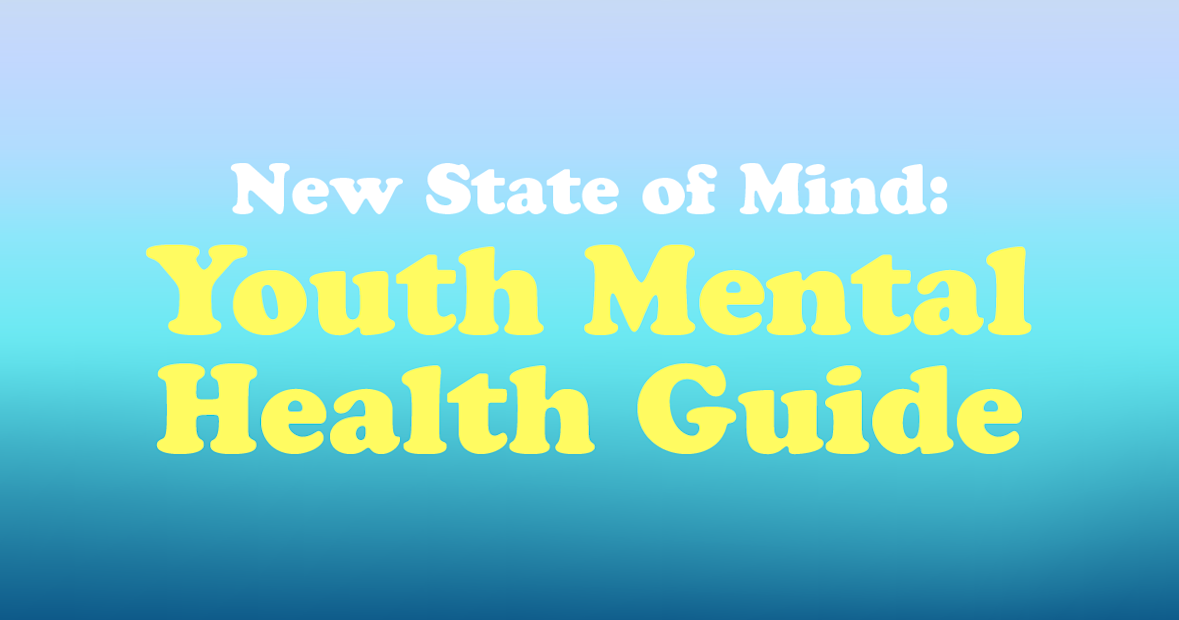
Young Americans are more stressed out than ever, and nearly half of Gen Z says they aren’t doing enough to manage stress. Young people could use some mental health support in 2020, especially with COVID-19 affecting over 55 million students in the US and millions more around the world. Through DoSomething’s New State of Mind campaign, powered by Blue Shield California as a part of the BlueSky Initative, thousands of young people submitted tips on how they’re getting through these especially tough times. We received 74,129 responses from DoSomething members, and we used them to create this first-of-its-kind crowdsourced mental health guide that’s for students, by students.
Check out their tips below on practicing self-care, dealing with the stress of digital learning, and supporting the mental health of those around you. (Plus, check out some additional resources at the bottom of this page.) And remember: the road to a healthier and happier generation starts right now with us.
I. SELF-CARE
General tips for taking care of yourself and your mental health.
1) Find a creative outlet.
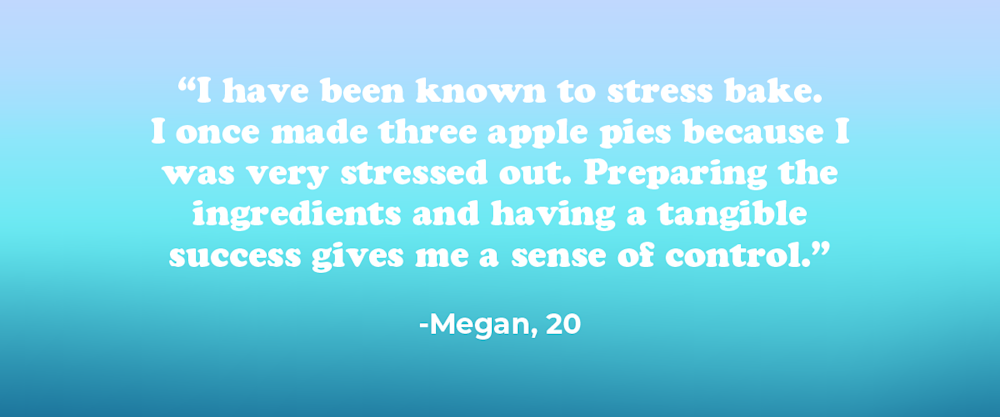
While going out may not be an option, you can still find your own form of escape through hobbies and passions. There are tons of ways for you to explore your creativity and take your mind off of the stressful stuff.
“Using and decorating my planner to keep myself productive has been very effective in calming me down,” says Cecilia, 14. “I love writing about everything that makes me enjoy life because it is a daily reminder that I should never take what I love for granted and instead relish in the present moment.”
Whether you’re continuing a long-held passion or picking up something totally new, there are plenty of things you can try from the comfort of your home. Some popular activities include drawing, knitting, dancing, or coloring, but don’t be afraid to think outside the box when pursuing a new hobby — things like gardening, podcasting, upcycling, or sculpting! The important thing isn’t that you become the best at it, but that it adds something positive to your day.
“Start with a simple low maintenance plant like a succulent, and while you take care of it take care of yourself,” says Anastasia, 19. “Give it water; give yourself water. Give it sun; give yourself sun. Work your way up to more demanding fruit and veggie plants for healthy eating too!”
2) Get moving, and get outside.
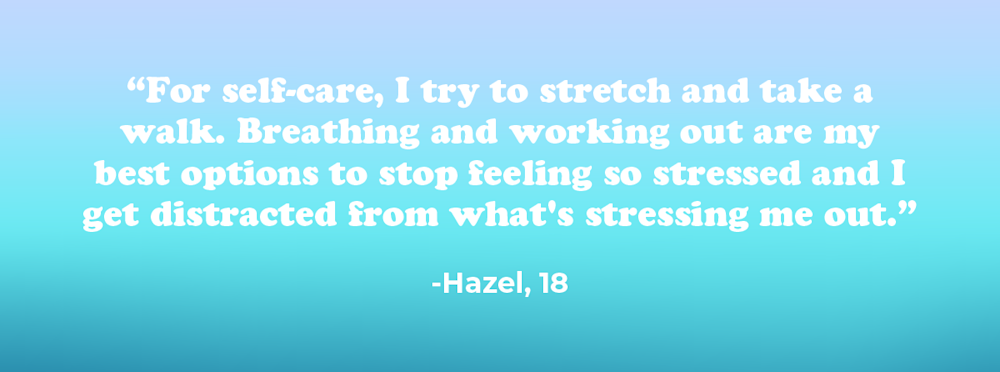
There’s a pretty strong link between exercise and positive mental health effects. It can boost your mood, alleviate anxiety, and provide a nice distraction. It’s also especially important when you’re sheltering at home and a little more limited in your movement (for example, walking around your school to get to classes versus sitting at the same desk all day for remote learning). It doesn’t have to be anything super intense — just try to get your body moving for 20-40 minutes each day.
“My best method of self-care is through exercise. During quarantine, I have learned new ways to exercise due to the elimination of access into gyms,” says Nicolas, 18. “My new favorite way to train my mind and body is through skipping rope. Though simple, it provides a means for high intensity cardiovascular training that is very fun!”
“I put on my headphones and go out for a run,” says Christopher. “Since I’m a runner, I like to go out for runs because they help me release stress and feel freedom and have no thoughts in my mind. Just enjoying the run.”
The only thing better than exercising is doing it outside. Staying indoors all day can contribute to feelings of isolation and stress, so try to regularly spend time outdoors (safely following physical distancing guidelines, of course). A solo walk or run can do wonders after being cooped up for a while. Be sure to wear a mask and maintain distance from other folks — check out your local health department for more specific guidelines.
“One thing that I do when I am feeling anxious is go for walks outside,” says Celeste, 18. “Being inside for a majority of the day has not been the best for my anxiety, so getting that fresh air is really crucial.”
“An effective thing that I do for self-care is walking around the neighborhood with my family,” says Mathias, 18. “This prevents me from going on my phone and overall allows me to be less distracted and more focused on the present. I can enjoy the nature around me, say hello to my neighbors, and enjoy my surroundings and family.”
3) Connect with your support systems.
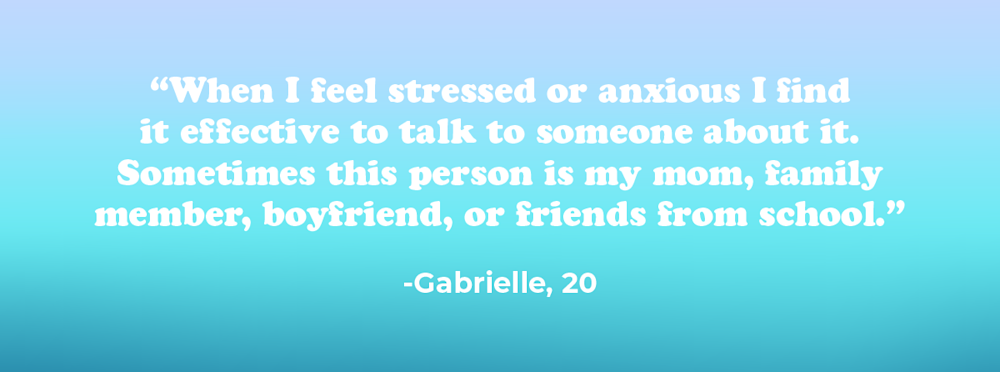
This year may have been a complete trash fire so far, but at least we’re all experiencing it together. If you’re feeling stressed out or overwhelmed, chances are that someone else can relate (and maybe even help you out). Don’t hesitate to reach out to friends or family when you need a little extra encouragement or support.
“When I am feeling stressed or anxious, one effective thing I do for self-care is to spend time with my family,” says Xiaoyang. “They can always guide me, calm me down and give me suggestions on how to change the situation to a better place rather than telling me or forcing me what to do.”
In an era of physical distancing guidelines and stay-at-home orders, connecting with others may look a little different. Facetime calls, Discord servers, or a few texts can help you reach out and stay in touch with the folks you care about. Keeping socially connected will help fight off feelings of isolation and loneliness, and when your loved ones need some support, you’ll be there for them too.
“Right now it’s important to talk to someone when your energy is low,” says Ye’Dayah, 19. “I’ve recently joined a Black mental health group so that I can get tips on how to cope with current events. I’ve been sharing these tips online for everyone to see.”
“I enjoy playing Animal Crossing. While it’s just a video game, it has the ability to link people together in an online world separated from the stresses of this virus,” says Bailey, 23. “I’m able to do something for other people, like give them hybrid flowers, or other hard to obtain items.”
4) Don’t be afraid to feel it out.
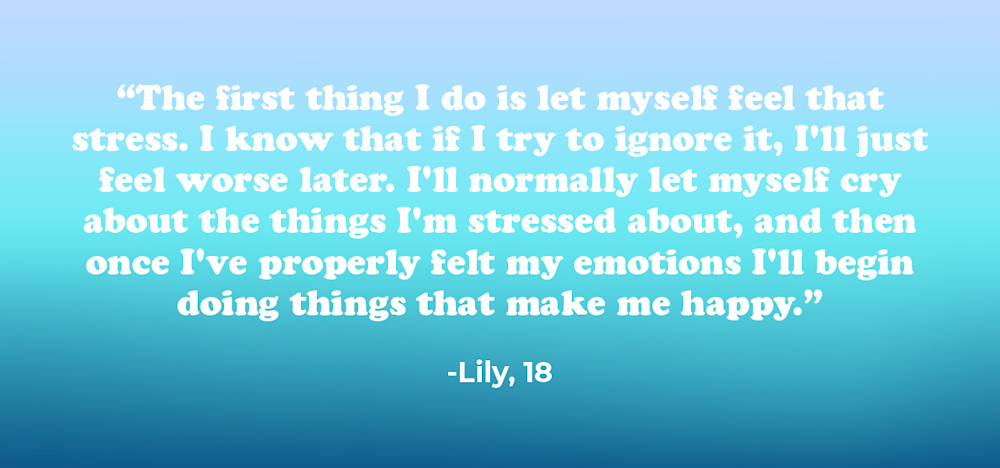
It may feel a little counterintuitive at first, but the best way to deal with strong emotions is to give yourself the space to really feel them. It’s way too easy to fall into a cycle of constant distractions without taking meaningful steps towards addressing your feelings.
“One of the most effective things I do for self-care is to have a good cry and let all the anxiety out. For me, I tend to bottle everything in, including my tears, which just helps my anxiety grow more,” says Patricia, 22. “Once I allow myself to cry, it feels as if everything negative is being washed away outside of my body through my tears and I no longer have a headache from holding it all in.“
You don’t have to solve your problems — just recognize that they’re there and try to release them. Cry it out, talk it through with someone, or just let out a good old scream. You’ll feel a little better, and it’ll make some emotional room for whatever you do next.
“When I am stressed, I tend to listen to music to cool me down. Another thing I do is always vent about the situation that is bothering you. Holding things in makes the situation worse,” says Terryn, 18. “Even if you don’t want to vent to anyone, writing it down and expressing how you feel is a big step. Expressing your feelings helps you drastically in tough situations.”
5) Do what works for you.
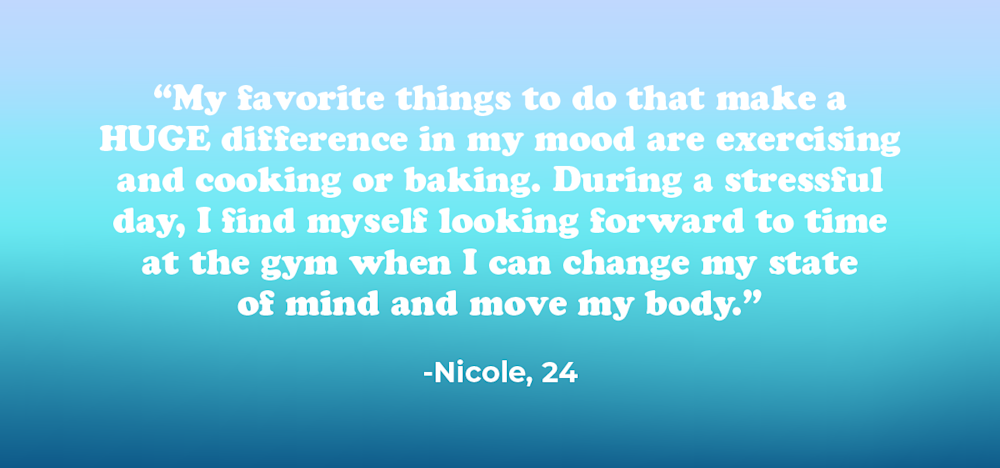
Ultimately, self-care is super personal. What works for one person won’t work for another, so explore a few different methods and see what sticks. There’s really no right or wrong way to take time for yourself.
“I unplug! I turn off all of my news sources on my phone and try to watch movies or TV shows or read books that I know have a happy ending just to pick myself up,” says Zykierra, 17. “I drink tea and relax and sometimes do an intense (or light, it doesn’t really matter) workout to take my mind off of things.”
“When I am feeling stressed or anxious, I almost always turn to music,” says Savannah, 17. “Sometimes I need the rhythms, sometimes I need the lyrics, and sometimes I just need to get carried away with a song that brings comfort and peace despite the world around me”
Also remember that self-care isn’t always about the super fun stuff — sometimes it means getting organized, tidying up, eating healthy, or just taking a second to breathe. Listen to your body and figure out what it is you really need in that moment.
“For a short term solution, the best thing I can do for myself is to keep me busy, this usually entails cleaning everything in sight, maybe put on some upbeat music while doing it,” says Harrison, 18. “For the long term, I think about the root cause of the stress, and what I can do about that root to make sure it does not happen again.”
II. DIGITAL LEARNING
Tips for dealing with the stress of online classes and remote learning.
1) Manage your time.
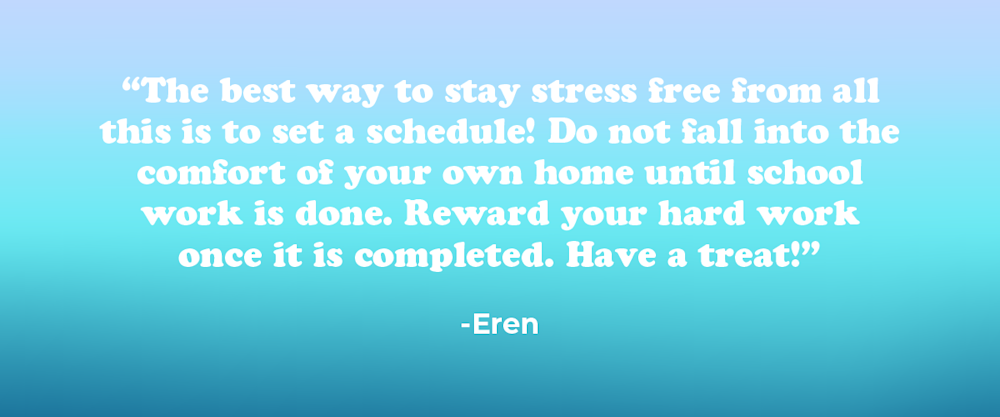
Time management is tricky even when you’re attending regular classes, and learning digitally just adds another layer of challenges. One of the main things you’ll need to combat is procrastination (which is made easier when you’re at home and not stuck in a traditional classroom), so cut the stuff that keeps you from getting your work done.
“Something that has helped me personally is putting away your distractions. Put your phone in a separate room or put it on silent to take away the temptation of checking instagram every few minutes,” says Jennifer, 16. “You should also consider doing your work on a desk/table, that way every time you sit in your desk or wherever you’re sitting your brain will automatically know that you are going to be in a mentally productive state.”
If keeping track of all the things on your to-do list gets difficult, try using some tools to stay organized. Having your tasks and deadlines written down somewhere will make them feel more tangible, and you’ll be better able to gauge your progress towards them.
“I suggest keeping reminders and alarms on your phone to help give yourself plenty of time to complete these assignments and prevent them from piling up,” says Caroline, 17. “I also recommend keeping a digital or physical calendar with important due dates!”
“I have started a habit tracker with three things to keep me motivated each day. Each night I check off if I got the item done and this way I keep myself accountable,” says Grace, 18. “Having this habit tracker gives me things to do so that I am not on Netflix all day. It also gives me a sense of accomplishment when I get to put the checkmark on the habit tracker. Seems silly, but it works.”
2) Reach out when you need help.
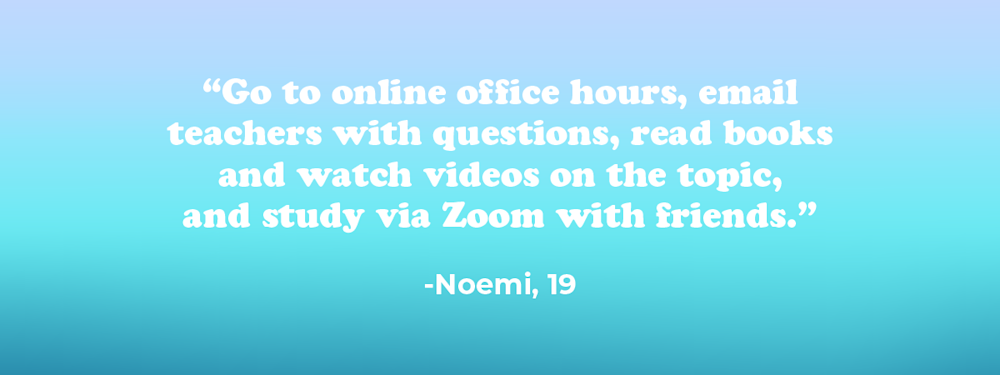
You may not be physically surrounded by your teachers and classmates, but you can still lean on them for help and support — just adapt digitally! Instead of catching your teacher in the hallway after class, send them a private Zoom message at the end of the lecture with your questions. Your teachers want you to succeed, so tell them when you’re having trouble, and they’ll be eager to help.
“Always remember that you have the power to communicate with your teachers and staff,” says Fanta, 15. “Don’t be afraid to ask them questions or let them know about anything you’re struggling with.”
Don’t let physical distance keep you from your friends either. Replace your library study session with a group Zoom or Facetime call, and chat before and after class like you normally would through texts. Together you can hold each other accountable for studying, remind each other about upcoming deadlines, and help each other understand the material.
“I created a group chat for all of the kids in each class, where we all could ask questions and remind each other about due dates,” says Will, 18.
“Find a private place where you can focus, and have some study tunes ready to get your brain into a relaxing study mood,” says Karen, 24. “Have a body double when studying for accountability.”
3) Find time to de-stress.

Stay motivated by building time into your schedule for both work and play. That way, you’ll know when it’s time to hunker down and get stuff done, and how long until you get a well-deserved break. (And that free time will feel a lot more enjoyable without unfinished assignments looming over your head.)
“I suggest that students make doing work a fun job!” says Kimberly, 17. “Maybe make a check-list, or reward yourself after a certain amount of work is completed. COVID-19 has put a lot of students in a funk, including myself. It is our responsibility to know our bodies and find out how to make us feel better!”
“Something that has helped me is keeping a healthy (and relaxed!) routine,” says Angelia, 18. “I made myself a gentle schedule that allows for forgetfulness and mistakes. My schedule encourages me to do things like eat 3 nutritious meals, drink water, and do something active like yoga or dog-walking. Doing simple things can really work wonders to revitalize you and your brain!”
III. HELPING OTHERS
Tips for supporting the mental health of your family and friends.
1) Check in with them (and really listen).
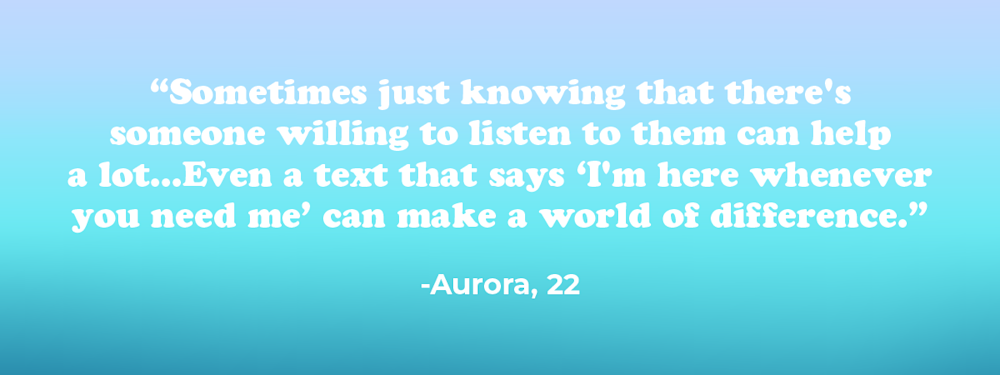
Stress and mental health challenges can be isolating enough without the added barrier of physical distancing. It’s crucial to check in on your loved ones regularly during these especially tough times. Even if things seem outwardly fine, you never know when someone is just waiting to be heard.
“Reach out to them and let them know you are thinking of them and they are loved and that you would love to talk or get together but do not push them,” says Emily, 18. “Allow them to open up and talk to you on their own time. Send them things that make you happy and share joy with them.”
When reaching out to a friend or family member, try to really listen to what they have to say and what they need from you. Sometimes, it’s just someone to vent to or bounce thoughts off of, and other times they may be looking for advice or support in getting something done.
“To support a friend, I will show my love for them and listen to them with an open mind. Sincerity and empathy are very important,” says Sophia, 18. “I will frequently check in with them and ask them if they are drinking enough water, going outside, etc. Physical health affects mental health and vice versa. I will remind them to be kind to themself.”
“I can help my friends and family by checking upon them often by asking simple questions like: ‘How are you doing right now?’ or ‘Did you eat today?’” says Kadidiatou, 17. “Furthermore, if they haven’t eaten much, I send them interesting recipes that they could easily make. Also, I give the option to talk out their feelings with me or change the topic to something humorous if they would prefer.”
2) Make time for them.
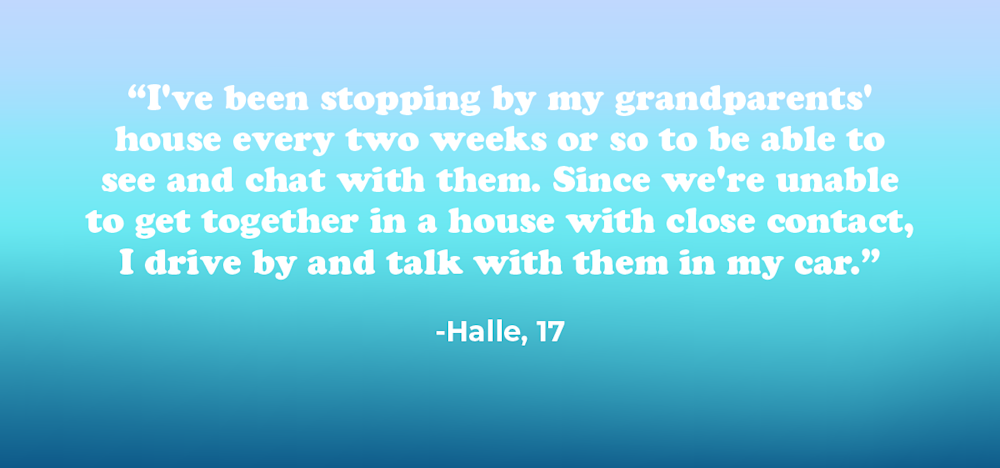
Beyond occasionally reaching out, try to find dedicated time to connect with your loved ones. Weekly, bi-weekly, or monthly virtual hangouts will give you all something to look forward to and a guaranteed space to be heard if you need it.
“Every morning and evening, we sit down and journal, even if we don’t feel like it because when we don’t feel like it is when we need to put our feelings on paper the most,” says Emilia, 16. “In addition, my family conducts daily check-ins in our group chat, encouraging each other and talking about what is causing stress for us.”
When scheduling social time with your friends or family, consider exploring different activities you can do together. If you’re following physical distancing guidelines, you can host a remote watch party, game night, or exercise class — stick with something you like or try something new each time!
“I plan to support [my sister] this summer by watching a movie or binge watching Dance Moms with her several evenings a week,” says Shane, 18. “I also plan to make the extra effort to go down to her room and talk to her after work.”
“My friends and I always join up to play games through FaceTime every weekend,” says Alyssa, 19. “Although we cannot see each other always, because we try to be mindful of COVID, we try our best to stay in touch!”
3) Support their mental health.
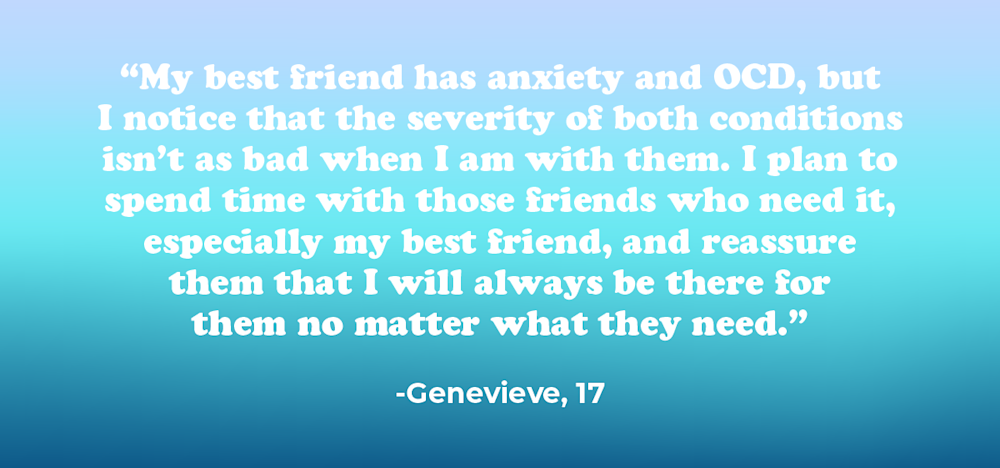
We all have different experiences and challenges with our mental health, so when trying to support your loved ones, be mindful of their specific situation and needs. Remember that if you aren’t sure how to be the most helpful, you can always ask.
“My mom and I used to garden when I was younger….. I think now that we’re both cooped up at home, and the fact that we’ve both been experiencing some anxiety, we can start planting our favorite flowers again — marigolds, sunflowers, and dahlias,” says Diana, 19. “She can disconnect from the media world, as she’s been obsessed with Facebook, and I from school work.”
“Sometimes I don’t have the strength to get out of bed or be active, and all I want is for someone to sit with me and talk (even if it’s just one-sided) or listen to anything I have to say,” says Kaitlin, 18. “I try and do the same for others through something as simple as [Facetiming] them while I’m doing other things so they know that I’m there.”
In that same spirit, be on the lookout for any signs that your friend or family member is going through a particularly difficult time with their mental health. Offer to help them with the things that feel especially burdensome, and connect them with mental health resources as needed (a few are linked at the bottom of this guide).
“My mother has worked in the mental health field for years so I know from her that people who develop mental illness may begin to show symptoms around my age,” says Alexander, 17. “My plan is to keep in touch with my friends and really pay attention so if I notice if they act differently or become depressed, I can be sure they get help before something tragic happens. The signs are usually there if someone is looking and it’s more important than ever now.”
IV. ADDITIONAL RESOURCES
READ:
- BIPOC Mental Health Guide
- Self-Care as a Young Black Activist
- 8 Ways to Practice Self-Care While Physical Distancing
- 8 Steps to Manage Your Time Better as a Student
- A Teenager’s Guide to Dealing With Family Tension
- The Dos and Don’ts of Friend Drama
CONTACT:
- National Suicide Prevention Lifeline: 24/7 at 1-800-273-TALK (8255)
- Crisis Text Line: 24/7 support at your fingertips, text DS to 741741
- The Trevor Project LGBTQ Hotline: 24/7 at 1-866-488-7386
- Substance Abuse and Mental Health Services Hotline: 24/7 at 1-800-662-HELP (4357)
- Directory of Additional Helpline Resources from NAMI
THANK YOU!
Super special thanks to all of the following DoSomething members who helped contribute to the New State of Mind guide. It (literally) wouldn’t be possible without you all.

